Takomborerwa Hove - Waste management in developing countries
Takomborerwa Hove - Waste management in developing countries
Takomborerwa Hove - Waste management in developing countries
You also want an ePaper? Increase the reach of your titles
YUMPU automatically turns print PDFs into web optimized ePapers that Google loves.
EWB-UK National Research & Education Conference 2011‘Our Global Future’4 th March 2011Year1949195419591960196619711977198019871998199920082010a2020aPopulation Area(ha) Density(persons/ha)16404 3386 4.823471 3386 6.932500 3386 9.658370 3386 17.2109461 20923 5.2172000 20923 8.2197461 22771 8.7230000 22771 10.1333120 22771 14.6Population<strong>in</strong>crease %per annum12.29.55.4478155 22771 21 3.3519033 22771 22.8661256 22771 29705948 22771 31976732 22771 42.9Table 3: Population Dynamics <strong>in</strong> Blantyre City (1949-2008), (Chikwenda, 2005)2010a - population estimate based on Chikwenda’s researchIssues affect<strong>in</strong>g waste <strong>management</strong><strong>Waste</strong> <strong>management</strong> services <strong>in</strong> Blantyre are under the jurisdiction of the Blantyre City Assembly. <strong>Waste</strong> <strong>management</strong> <strong>in</strong>develop<strong>in</strong>g <strong>countries</strong> is affected by many factors. These <strong>in</strong>clude f<strong>in</strong>ancial and technical constra<strong>in</strong>ts. F<strong>in</strong>ancial constra<strong>in</strong>ts <strong>in</strong>develop<strong>in</strong>g <strong>countries</strong> ma<strong>in</strong>ly arise from the proportion of people who cannot contribute towards the services they areus<strong>in</strong>g. As a result municipal authorities tend to allocate resources to areas with higher tax yields (Zurbrugg, n.d.). Peoplethat live <strong>in</strong> <strong>in</strong>formal settlements are not likely to be contribut<strong>in</strong>g <strong>in</strong> any way to services. A report by the MalawiGovernment notes the need for improv<strong>in</strong>g the human resource at all levels aimed at plann<strong>in</strong>g, design<strong>in</strong>g andimplement<strong>in</strong>g sanitation <strong>in</strong>itiatives and programmes (Government of Malawi, n.d.a). . The government notes that only 65%of those liv<strong>in</strong>g <strong>in</strong> urban areas have access to improved sanitation.AimThis study aims to look at issues affect<strong>in</strong>g solid waste disposal <strong>in</strong> the city of Blantyre <strong>in</strong> Malawi. The hypothesis of thisthesis is that solid waste <strong>management</strong> <strong>in</strong>frastructure <strong>in</strong> Blantyre City, Malawi, needs to be improved to help create a moresusta<strong>in</strong>able environment. The objectives of this study are to:1. Investigate solid waste <strong>management</strong> <strong>in</strong>frastructure that can be applied to Blantyre City2. Develop recommendations for improvements to solid waste <strong>management</strong> <strong>in</strong>frastructure <strong>in</strong> Blantyre City.2. Literature ReviewConsequences of poor waste <strong>management</strong> <strong>in</strong>clude water pollution, air pollution and aesthetically unpleas<strong>in</strong>g sights. Poor<strong>management</strong> of waste <strong>in</strong> urban areas where space is sometimes at a premium affects the quality of life people have.Effective <strong>management</strong> of waste can reduce the environmental impact and human health related effects it can have.Solid wasteSolid waste disposal <strong>in</strong>volves the collection, transportation, process<strong>in</strong>g and f<strong>in</strong>al disposal of the waste where it cannot bemoved or recycled (Rushbrook and F<strong>in</strong>necy, 1988). One issue that is highlighted is the presence of a higher organiccontent to the waste found <strong>in</strong> develop<strong>in</strong>g <strong>countries</strong> (Karekezi, Kithyoma and Onguru, 2009). This gives the waste a higherdensity and moisture content. This creates various problems for its <strong>management</strong>. Improper disposal of this type of wastehas many detrimental environmental effects.28 per cent of waste generated <strong>in</strong> Blantyre City was collected by the city assembly <strong>in</strong> 2002 (Palamuleni, 2002). Thissuggests that a large proportion of waste generated <strong>in</strong> the Blantyre City was be<strong>in</strong>g improperly disposed of. Residents <strong>in</strong>peri-urban areas are shown to be us<strong>in</strong>g methods that are not environmental <strong>in</strong> dispos<strong>in</strong>g of their waste. Some plot ownersdig pits on their property for the purpose of waste disposal while others throw waste away <strong>in</strong>discrim<strong>in</strong>ately (Manda,2009). Traditional ional hous<strong>in</strong>g areas were designed to encourage residents to dig such pits. Other residents simply dumpPanel Presentation: IndustryAuthor: <strong>Takomborerwa</strong> <strong>Hove</strong>Institution: University of Strathclyde128


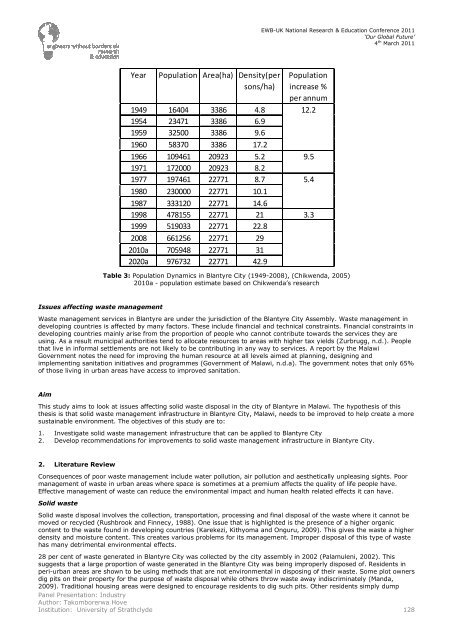
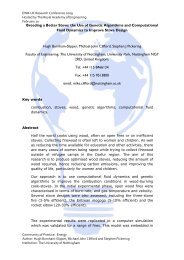

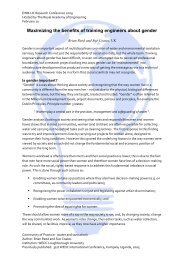
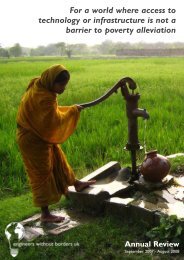
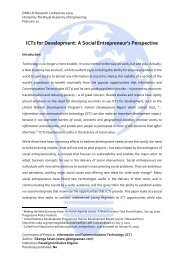
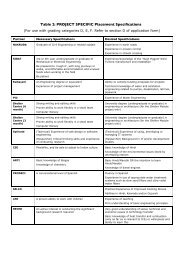

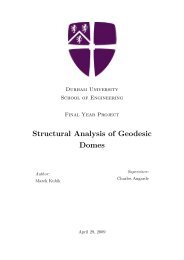
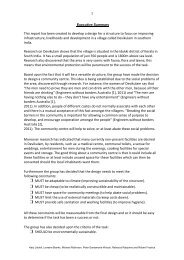


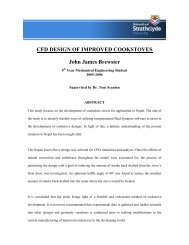
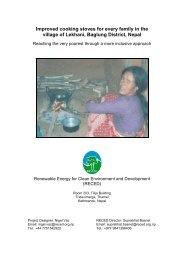
![Ethical Fundraising Guidance[1].pdf - Engineers Without Borders UK](https://img.yumpu.com/36288951/1/184x260/ethical-fundraising-guidance1pdf-engineers-without-borders-uk.jpg?quality=85)